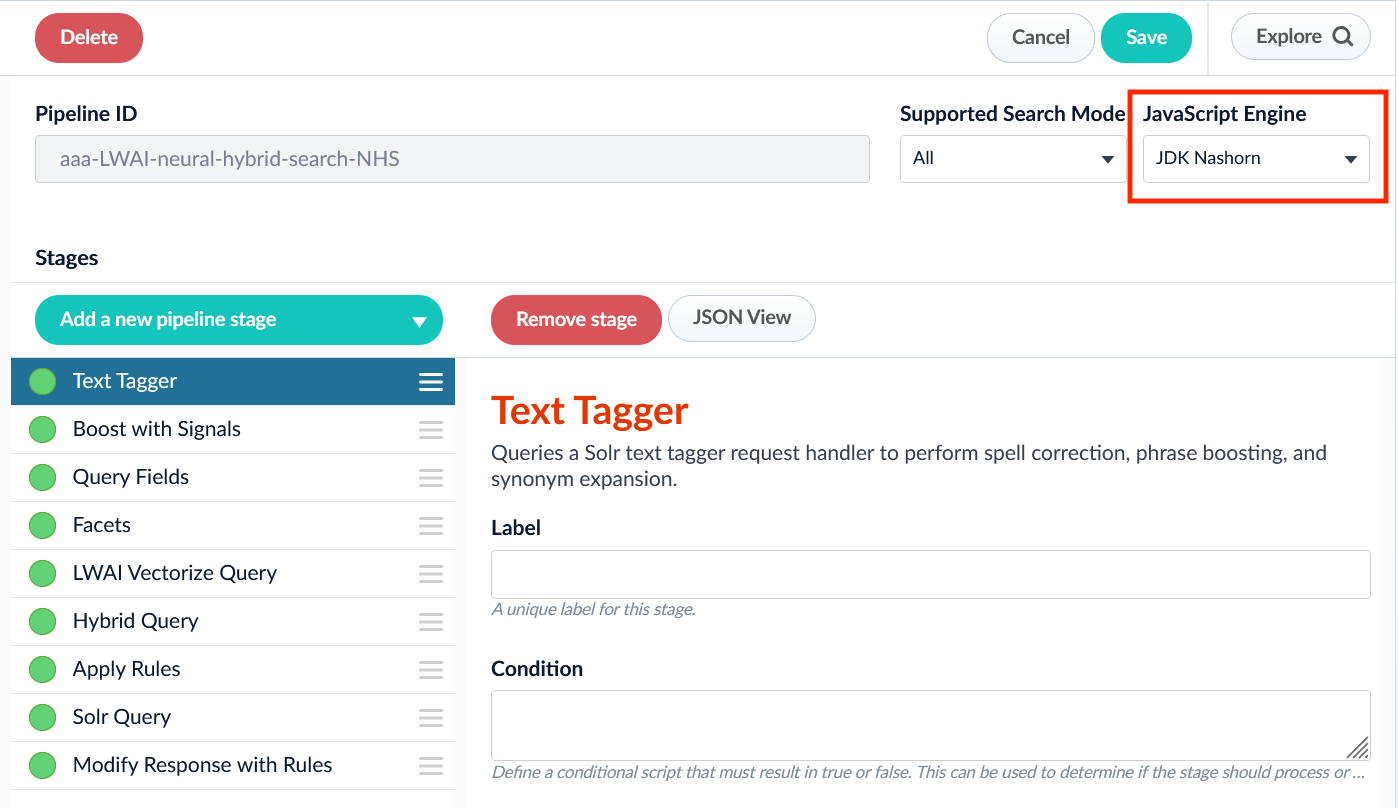The JavaScript engine used by Managed Fusion
The default JavaScript engine used by Managed Fusion is the Nashorn engine from Oracle. See The Nashorn Java API for details. In Managed Fusion 5.9.6 and up, you also have the option to select OpenJDK Nashorn. While Nashorn is the default option, it is in the process of being deprecated and will eventually be removed, so it is recommended to use OpenJDK Nashorn when possible. You can select the JavaScript engine in the pipeline views or in the workbenches. Your JavaScript pipeline stages are interpreted by the selected engine.
JavaScript Query Stage global variables
JavaScript is a lightweight scripting language. In a JavaScript stage, Fusion uses the Nashorn engine, which implements ECMAScript version 5.1. Although Nashorn does include some ECMAScript 6 (ES6) features such aslet, const, or template strings, Fusion does not enable ES6 by default, so ES6 support is not guaranteed.
What a JavaScript program can do depends on the container in which it runs.
For a JavaScript Query stage, the container is a Managed Fusion query pipeline.
The following global pipeline variables are available:
| Name | Type | Description |
|---|---|---|
request | Request for a Regular Query | The request variable contains Solr query information and is referred to as a regular request. A regular query request does not include Search DSL (domain specific language) parameters. |
request | DSL Request | The request variable is also used when the query contains parameters for a Search DSL (domain specific language) request. See Domain Specific Language for more information. |
response | Response for a Regular Query | The response variable contains Solr response information, and is used to return information from a regular request. Because a regular request does not include Search DSL (domain specific language) parameters, the response will not return Search DSL results. |
response | DSL Response | The response variable is also used to return information from a Search DSL (domain specific language) request. See Domain Specific Language for more information. |
ctx | Context | A map that stores miscellaneous data created by each stage of the pipeline. Use the ctx variable instead of the deprecated _context global variable. ctx variable is used to: ● Pass data from one stage to another ● Store data that needs to be passed from one custom stage to a later custom stage The data can differ between stages: ● If the previous stage changes the data ● Based on the configuration of each stage If the data is modified in one stage, it may cause a later stage to function irregularly. |
collection | String | The name of the Managed Fusion collection being indexed or queried. |
solrServer | BufferingsolrServer | The Solr server instance that manages the pipeline’s default Managed Fusion collection. All indexing and query requests are done by calls to methods on this object. See solrClient for details. |
solrServerFactory | solrClusterComponent | The SolrCluster server used for lookups by collection name which returns a Solr server instance for that collection, e.g. var productsSolr = solrServerFactory.getSolrServer("products");. |
QueryRequestAndResponse | QueryRequestAndResponse | Used to create query pipeline requests and responses. |
JSONResponse | JSONResponse | Returns list of info as a string. |
See Custom JavaScript Query Stage examples for more information.
Syntax variants
JavaScript stages can be written using legacy syntax or function syntax. The key difference between these syntax variants is how the “global variables” are used and interpreted. While using legacy syntax, these variables are used as global variables. With function syntax, however, these variables are passed as function parameters.Legacy syntax
Function syntax
ImportantFunction syntax is used for the examples in this document.
Global variable logger
The logs are output to the query service logs for custom query stages. Access the Log Viewer and filter on this service to view the information.
See also
- Managed Fusion Pipeline Javadocs
- JavaScript Query Stage
- Custom JavaScript Query Stage examples
- Custom JavaScript Stages global variables
- Managed JavaScript Query Stage
JavaScript in Fusion
The course for JavaScript in Fusion focuses on how to leverage JavaScript in Fusion to build powerful and responsive scripts at index and query time.